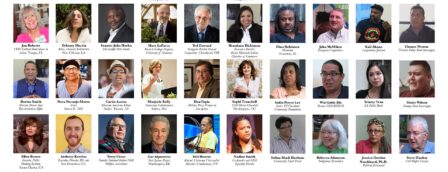 I am capturing terrific video stories about creative good people genuinely making a difference. It is a joy to be around these folks and so uplifting to hear their passion and their dedication to what they are doing. After interviews here in Bainbridge Island, WA including interview with Fran Korten, publisher of YES! Magazine, I will have 33 videos completed. Then, on the road again for more stories along the next 4,550 miles.
I am capturing terrific video stories about creative good people genuinely making a difference. It is a joy to be around these folks and so uplifting to hear their passion and their dedication to what they are doing. After interviews here in Bainbridge Island, WA including interview with Fran Korten, publisher of YES! Magazine, I will have 33 videos completed. Then, on the road again for more stories along the next 4,550 miles.
It will take forever to give you a synopsis on all of them but here is brief rundown. A few you have already heard about—Dulaney Martin, the artist in New Orleans giving a musical voice to the people of the 9th Ward; Malcolm White and Senator John Horhn about the Blues and its impact on the creative economy in Mississippi; American Indian Commission’s work to end stereotyping and empower Native Americans in Denver, the hub for Native American organizations in the US; Karen and Gail in Phoenix, a loving couple for 44 years, who have built their own cabin in a Lesbian community in Duluth, MI and Carlos Acosta, Mexican American ethnic studies’ teacher in Tucson and the adoption of ethnic studies in other states due to the landmark experiment that he was involved in Tucson High School that closed the achievement gap between students of color and whites.
The innovative Patient Physician Cooperative in Houston that puts patients first and recreates the old time doctor/patient relationships of times past at low cost with many benefits for low and middle income folks.
Nora Naranjo Morse, an artist and sculptor living on a Pueblo in Santa Fe, has a huge installation “Becoming” on the Washington Mall and another one on the Working Class and Inequity coming this Fall, both sponsored by the Smithsonian. She shared her view that artists need to offer a prism to look at the world and its happenings in a unique way.
In California, Ellen Brown spoke about the state banking movement, currently an initiative in 20 states and Andreas Karelas in San Francisco discussed his novel nonprofit to spread solar energy through a revolving investment fund that solarizes community centers.
Portland had a record number of interviews that included the urban farmers’ collective in a low income neighborhood that has, perhaps, the first Flower Farm as Community Supported Agriculture; a collaborative of nonprofits, university and the city working on an Eco-District—a neighborhood on the cusp of being gentrified– that puts Equity at the forefront of its work with creative initiatives so that low income people will not be displaced; a Cooperative of Community Acupuncture Centers that was birthed here with the Working Class Acupuncture Center that offers a sliding scale fee of $15 to $40 dollars and you pay what you believe you can afford; Dennis, a man with a small truck, who delivers foods including perishables from grocery store to several nonprofits including schools and Dignity Village for the elderly; Terry Cross, Executive Director of National Indian Child Welfare Board that brings beloved Native American traditions back to parenting and community development; and folks living in an Eco-Village (co-housing) talking about overcoming pitfalls and challenges that seem to befall some initiatives like this so that now they can enjoy the benefits of what living in community brings.
In Olympia, there were interviews with the folks involved in making Quixote Village happen—an innovative approach to homelessness that involves tiny houses—and a resident, who is part of the Executive Council that governs the community and speaks eloquently about moving in on Christmas Eve last year. Also an interview with the Executive Director of the North West Cooperative Development Center, that funds cooperative initiatives like the one in Duvall, Washington where mobile home owners raised the funds to buy their land so they are not living in fear of being displaced by a landlord.
Today, I am in Bain Bridge Island, Washington where I will interview David Korten, author and economist, and long-time activist for the New Economy and Fran Korten, publisher of YES! Magazine, a self-sustaining magazine that does the best job in covering stories around the country where people are transforming their communities through creative endeavors. I will also be interviewing others people involved in the Sharing Economy—yep, another approach of the New Economy that ranges from Share Your Tools Libraries; a recently launched online platform to Buy Nothing that has spread to 18 cities already—all about sharing your stuff and an artists’ cooperative the BARN.
Lots more to cover including Divine Chocolate, the only chocolate company co-owned by the cocoa farmers in Africa; Thistle Farms and Café—a business in Nashville that provides living space, business training and support to trafficking victims; the Evergreen Cooperative Laundry and its offshoots that are transforming the economy in Cleveland; and a parent whose daughter was murdered, who reached out to the killer and is now engaged in restorative justice and healing between victims and perpetrators in Tennessee.
